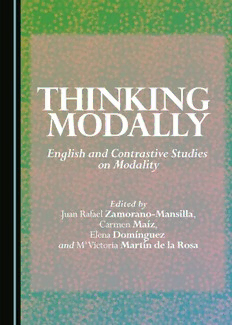
Thinking Modally: English and Contrastive Studies on Modality PDF
Preview Thinking Modally: English and Contrastive Studies on Modality
Thinking Modally Thinking Modally : English and Contrastive Studies on Modality Edited by Juan Rafael Zamorano-Mansilla, Carmen Maíz, Elena Domínguez and Mª Victoria Martín de la Rosa Thinking Modally: English and Contrastive Studies on Modality Edited by Juan Rafael Zamorano-Mansilla, Carmen Maíz, Elena Domínguez, and Mª Victoria Martín de la Rosa This book first published 2015 Cambridge Scholars Publishing Lady Stephenson Library, Newcastle upon Tyne, NE6 2PA, UK British Library Cataloguing in Publication Data A catalogue record for this book is available from the British Library Copyright © 2015 by Juan Rafael Zamorano-Mansilla, Carmen Maíz, Elena Domínguez, Mª Victoria Martín de la Rosa and contributors All rights for this book reserved. No part of this book may be reproduced, stored in a retrieval system, or transmitted, in any form or by any means, electronic, mechanical, photocopying, recording or otherwise, without the prior permission of the copyright owner. ISBN (10): 1-4438-8044-2 ISBN (13): 978-1-4438-8044-2 TABLE OF CONTENTS Acknowledgments ...................................................................................... ix Introduction ................................................................................................ xi The Editors Part I: Studies on Modality, Evidentiality and Temporality Explicitness of Epistemic Modal Marking: Recent Changes in British and American English Svenja Kranich and Volker Gast ................................................................. 3 I want you to and I need you to in Modern and Present-Day English Olivier Polge ............................................................................................. 23 Modals of Obligation in Dialogic Registers of British English Soili Nokkonen ........................................................................................... 47 Why Epistemic may is Rare in Questions and Epistemic canin Statements: A Problem for the Semantics-Pragmatics Interface Patrick J. Duffley ....................................................................................... 77 A Functional Approach to the Modal Adverbs no doubt, doubtless, and undoubtedly Daisuke Suzuki........................................................................................... 89 On the Uses of would in Epistemic Contexts Grégory Furmaniak and Paul Larreya .................................................... 105 Modality, Habituality, and Auxiliation: The Case of would and used to in Habitual Utterances Katherine Hrisonopulo ............................................................................ 125 Temporal Interpretation of English and Greek Modals: A Crosslinguistic Comparison Eleni Staraki ............................................................................................ 149 vi Table of Contents The Narrative Present Perfect in English Marc Fryd ................................................................................................ 185 Re-examining Evidentiality as a Pragmatic Notion Jelena Timotijevic .................................................................................... 203 Part II: Modality, Stance and Evaluation in Genres and Discourse Domains No wonder as a Marker of Epistemic Modality and Affective Evaluation Laura Alba-Juez and Elena Martínez Caro ............................................. 231 The Annotation of Appraisal: How Attitude and Epistemic Modality Overlap in English and Spanish Consumer Reviews Marta Carretero and Maite Taboada ...................................................... 249 Epistemic and Attitudinal Adverbs and Adjectives in MICASE: Are there Differences according to Disciplines? SilviaMolina ........................................................................................... 271 The Concept of Modality through Cognitive Grammar and the Conceptualisation of Emotions: Reality and Irreality applied to the Concept of (Phobia) Cristina Luque Agulló ............................................................................. 299 Stance and Subjectivity/Intersubjectivity Assessment in the Essays of Virginia Woolf Margarita Sánchez Cuervo ...................................................................... 325 Modality in English and Spanish Advertising Slogans Pilar López Sánchez ................................................................................ 345 Why are Magazine Advertisements So Creative?: A Metaphor-Based Approach Mª Victoria Martín de la Rosa and Elena Domínguez Romero ............... 367 Sentential Epistemic and Evidential Devices in Spanish and English Texts on Computing Francisco Alonso-Almeida......................................................................383 Thinking Modally: English and Contrastive Studies on Modality vii The Coding of Modality in Research Article Discussions: Author’s Commitment and Reader’s Involvement Luz Gil-Salom and Carmen Soler-Monreal ............................................. 409 Modality Awareness Development in Narratives for Young Readers of English María Ángeles Martínez .......................................................................... 429 Using Corpus Annotation for the Teaching of Modal Meanings in English and Spanish Jorge Arús, Juan Rafael Zamorano-Mansilla and Julia Lavid ............... 449 ACKNOWLEDGEMENTS The editors of this volume would like to express their gratitude to the Spanish Ministry of Science and Innovation1 and the department of English Studies I (Universidad Complutense of Madrid) for their financial support. Our thanks must also be extended to all those that made possible the success of ModE4 in the academic and the human dimensions: the members of the organizing committee (Juana Marín Arrese, Marta Carretero, Jorge Arús, Elena Domínguez, Carmen Maíz, Mª Victoria Martín and Juan Rafael Zamorano-Mansilla), the BA and MA students who collaborated with this committee, and the members of the scientific committee (Francisco Alonso Almeida, Johan van der Auwera, Antonio Barcelona, Enrique Bernárdez, Marisa Blanco, Frank Brisard, Pierre Busuttil, Rosario Caballero, Bert Cornillie, Margarita Correa, Nicole Delbecque, Angela Downing, Marciano Escutia, Roberta Facchinetti, Teresa Fanego, Francisco Garrudo, Dirk Geeraerts, Gaëtanelle Gilquin, María de los Ángeles Gómez, Montserrat González, Santiago I. González Fernández-Corugedo, Pilar Guerrero, Christopher Hart, Liesbet Heyvaert, Laura Hidalgo, Iraide Ibarretxe, István Kecskes, Gitte Kristiansen, Paul Larreya, Julia Lavid, Javier Martín Arista, Mª Ángeles Martínez, Begoña Núñez, Ana Pinto, Jesús Romero, Francisco Ruiz de Mendoza, Jesús Sanchez, Augusto Soares da Silva, Anastasios Tsangalidis and Christopher Williams). 1 Acción complementaria “Fourth International Conference on Modality in English- ModE4” (“4º Congreso internacional de modalidad en inglés-ModE4”) (Ref.: FFI2009-08190-E/FILO), (http://www.ucm.es/centros/webs/se5065/), Dirección General de Investigación, Ministerio de Ciencia e Innovación, Madrid, 2010
